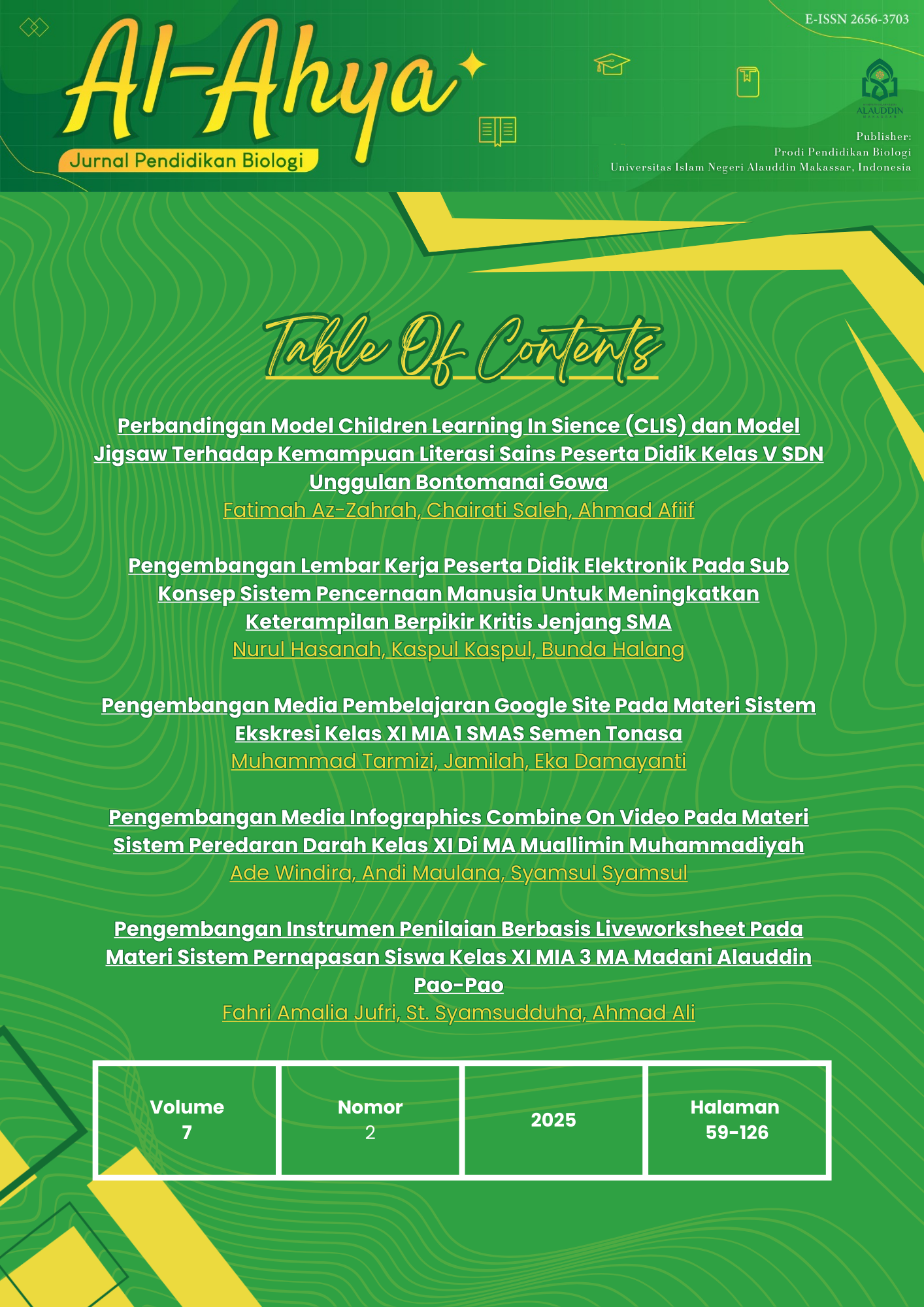Perbandingan Model Children Learning In Sience (CLIS) dan Model Jigsaw Terhadap Kemampuan Literasi Sains Peserta Didik Kelas V SDN Unggulan Bontomanai Gowa
Abstract
This study aims to determine the differences in scientific literacy skills of fifth-grade students of SDN Unggulan Bontomanai Gowa who are taught using the Children Learning in Science (CLIS) model and the jigsaw cooperative model. The type of research used is a quasi-experimental with a pre-test-posttest nonequivalent control group design. The study population was all 88 fifth-grade students. Through a multistage random sampling technique, 15 students were selected in experimental class 1 taught with the CILS model, and 15 students in experimental class 2 taught with the jigsaw cooperative model. To measure students' scientific literacy skills, a multiple-choice test instrument was used. The data analysis techniques used were descriptive analysis and inferential analysis. The study result showed that the average score of the scientific literacy test results of students taught using CLIS model was 76, and the average score of the scientific literacy test results of students taught using the jigsaw cooperative model was 70. The results of the two-sample t-test showed a t value = 0.026 < 0.05. This indicates that Ha is accepted, which means there is a difference in the results of the scientific literacy test between students taught using CLIS model and the jigsaw cooperative model.
Downloads
References
Affandi, L. H., Saputra, H. H., & Husniati, H. (2020). Apakah Tingkat Kebahagiaan Bisa Menjelaskan Hasil Belajar Peserta didik Sekolah Dasar?. PROGRES PENDIDIKAN, 1(3), 168–176. https://doi.org/10.29303/prospek.v1i3.2
Alfiah, M. H., Bramastia, & Sukarmin. (2024). ‘Peran literasi sains dalam meningkatkan Kompetensi Siswa SMK: Sebuah Tinjauan Literatur’. Proceeding Biology, 2 (20)
Aminah, S (2024). Pengaruh Model Pembelajaran CLIS (Children Learning in Science) Terhadap Literasi Sains Siswa Pada Muatan Pembelajaran IPA di Kelas V SD Negeri 001 Teratak, Skripsi. Yogyakarta, UIN Sunan Kalijaga.
Awang, (2021). ‘Keefektifan Model Pembelajaran Children Learning in Science (CLIS) Pada Mata Pelajaran IPA Ditinjau Dari Minat Dan Hasil Belajar Siswa Sekolah Dasar’. Vox Educatisi Jurnal, 4(21).
Bybee, R. W. (2009). The BSCS 5E Instructional Model and 21st Century Skills. Colorado Springs, CO: BSCS.
Firdha, Y. (2023). Analisi Rendahnya Literasi Sains Peserta Didik Indonesia: Hasil PISA dan Penyebabnya. LENSA (Lentera Sains): Jurnal Pendidikan IPA, 13(1), 11-19. Diakses dari https://doi.org/10.24929/lensa.v13i1.283
Hadi, S., & Novaliyosi, (2019). TIMSS Indonesia (Trends In International Mathematics And Science Study). Prosiding Seminar Nasional. Program Studi Magister Pendidikan Matematika Universitas Siliwangi, Tasikmalaya: 19 Januari 2019. Hal. 565.
Mullis, I. V. S., dan Martin, M. O. (2015). Trend in International Mathematics and Science Study (TIMSS, IEA
Ni Ketut Karsini. (2020). ‘Penerapan Model Pembelajaran Children Learning in Science (CLiS) Upaya Meningkatkan Prestasi Belajar IPA, Jurnal Ilmiah Pendidikan Profesi Guru, 3(2).
Organisation for Economic Cooperation and Development. (2023).PISA 2018:Insights and Interpretations. Paris: OECD Publishing.
Reny , K & Agung, P. (2020). ‘Pembelajaran Literasi Sains Melalui Pemanfaatan Lingkungan’, Jurnal Pedidikan, 3(20).
Samatowa, U. 2011. Pembelajaran IPA di Sekolah Dasar. Jakarta: PT Indeks.
Sumarti.S.,Rahayu.S. & Madlazim. (2015). ‘Pembelajaran IPA dengan Inkuiri Terbimbing Menggunakan Hypermedia dan Media Riil ditinjau Gaya Belajar dan Kemampuan Awal". Jurnal Pendidikan & Pembelajaran. 2 (2). 45-52. Diakses dari http://www.unes.ac.id.
Windah, S. (2020). Upaya Meningkatkan Hasil Belajar IPA Menggunakan Metode Group Resume pada Siswa Kelas V SD Kacangan I, Skripsi. Surakarta, Universitas Muhammadiyah Surakarta.
Yuni , T.A., &, Elvira, H. (2023). ‘Perbedaan Efektifitas Model Pembelajaran Kooperatif Tipe Jigsaw dan Tipe To Stay To Stray Terhadap Hasil Belajar IPA Kelas V SD, Jurnal Ilmiah Ilmu Pendidikan, 1(12).
Downloads
Published
Issue
Section
License
Copyright (c) 2025 Fatimah Az-Zahrah, Chairati Saleh, Ahmad Afiif

This work is licensed under a Creative Commons Attribution-ShareAlike 4.0 International License.















